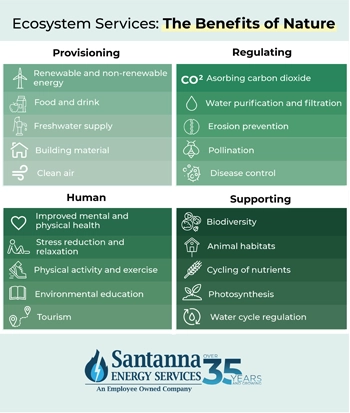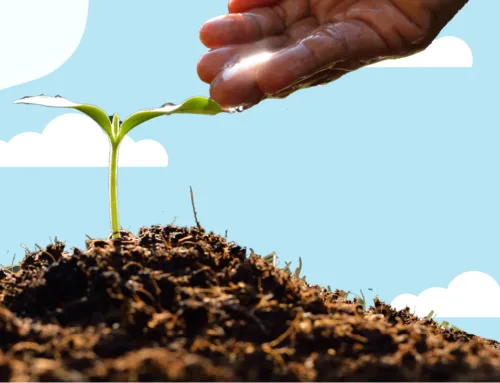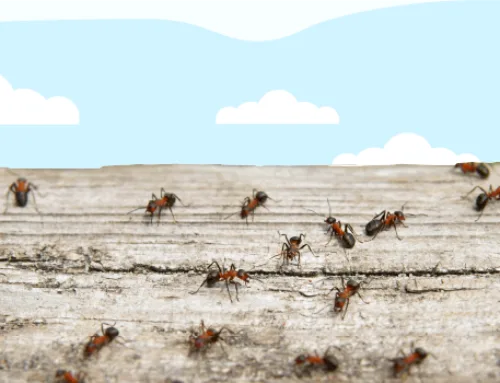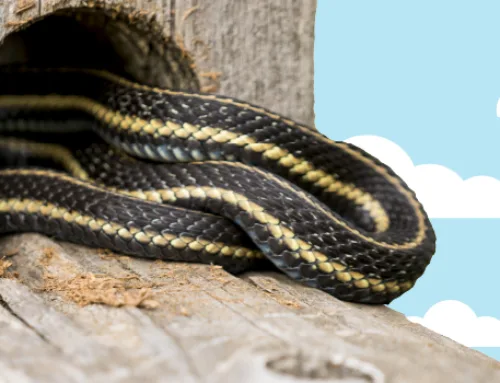How You Can Support Healthy Ecosystems
by Jenna Mendez
10.4 min read

We all want to make sure the ecosystem is healthy, but sometimes it’s difficult to know the best to way contribute. From switching off lights when they aren’t in use, to planting more trees and plant life in your backyard. There are many small steps we can take that add up to a big impact on our ecosystem. Making small changes to our daily habits can help us make a difference in the fight to protect our ecosystems.
The importance of maintaining biodiversity
Maintaining biodiversity can help protect ecosystems from the effects of climate change and other human activities. Believe it or not, a healthy ecosystem has more resources to buffer against changes in climate. A healthy ecosystem also helps to ensure that things like water cycles and pollination remain intact. Moreover, when there is less biodiversity, animal species can become overspecialized. Animals can be especially vulnerable when environmental conditions change suddenly. Diverse living things are vital for ecosystem protection against disruption and instability.
What are ecosystem services?
Ecosystem services refer to the benefits that humans receive from the natural environment. These can be direct or indirect, tangible or intangible. Examples of ecosystem services include clean air and water, fertile soil for agriculture, pollination of crops by insects, and regulation of climate through carbon sequestration. But it’s not just about the essentials like food and water. Nature does so much more! Ecosystem services also give us a boost in our physical and mental well-being. They offer us places to relax, have fun, and connect with nature’s beauty. Whether it’s hiking in the woods or finding peace in a quiet spot, these experiences are part of what nature provides. As humans continue to impact the environment, it is necessary to recognize the value of ecosystem services and ensure their protection for the benefit of current and future generations.
Supporting ecosystems in your own backyard
The easiest way to support healthy ecosystems in your backyard and home is by planting trees and plant life. Trees and plants help provide food and shelter for wildlife, regulate air temperature, improve air quality, and more! To create healthy ecosystems in your backyard, you should plant native species. It’s also a great practice to remove invasive weeds and create wildlife-friendly spaces like setting up bird feeders, watering holes, and nesting areas. Controlling pests is also important for maintaining a balanced ecosystem and avoiding pesticides can help keep wildlife healthy and keep bees thriving.
Now that you have some basic tips on how to support ecosystems in your own backyard, let’s jump into some other great tips for your home and community that can really make a difference. Here are 8 ways you can do just this:
1. Conserve water resources
Conserving water is a crucial step in supporting healthy ecosystems. Not only does it help to sustain the natural environment, but it also has many other benefits. By conserving water, we can reduce the stress on aquatic habitats and ensure that there is enough water for plants and animals to thrive. It might be overwhelming to figure out where you can start to conserve water but believe it or not, the easiest way to do so is through your home! Here are the best ways you can conserve water in your home:
- Repair leaking faucets, toilets, and pipes promptly. According to the EPA, a leaky faucet that drips at one drop per second wastes 3,000 gallons per year!
- Replace showerheads and faucets with water-conserving ones! If you’re looking to switch, look for models with WaterSense labels. According to the EPA, products with this label are 20% more energy efficient than others.
- Reducing your shower time by a few minutes can save a considerable amount of water.
- Don’t let the water run unnecessarily while brushing your teeth, shaving, or washing dishes.
- Choose Energy Star-Certified water-efficient appliances like dishwashers and washing machines. Energy Star-rated appliances often come with water-saving features.
- Consider washing your dishes instead of handwashing your dishes. Hand washing your dishes can waste 49 liters of water compared to 12 liters of water that dishwashers use.
- Install a rain barrel to collect rainwater for outdoor use like watering plants or cleaning.
- Use drip irrigation systems or soaker hoses for gardens and plants, as they target the roots and minimize evaporation.
2. Conserve energy
Conserving energy is not only essential for reducing our carbon footprint and combating climate change, but it also has a positive impact on the health of ecosystems. Energy production often involves fossil fuels, which release harmful pollutants into the environment and contribute to air and water pollution. By conserving energy, we can reduce our reliance on fossil fuels and help protect the natural environment. But don’t worry, there are small ways to conserve energy in your home that can still make a positive impact on the environment:
- Replace incandescent bulbs with energy-efficient LED or CFL bulbs. LED light bulbs use 75% less energy and last 25 times longer!
- When not in use, unplug chargers, electronics, and appliances, or use power strips to easily turn off multiple devices at once. Even in standby mode, many devices consume energy.
- Upgrade to energy-efficient appliances! Newer models often use less energy than older ones.
- Install a programmable or smart thermostat to regulate temperature settings efficiently. Smart thermostats can adjust the temperature in your home to an eco-friendly temperature to conserve energy.
- Use natural ventilation by opening windows and doors strategically to allow fresh air in, reducing the need for air conditioning.
- Conduct an energy audit to identify areas where energy is being wasted. This can help pinpoint specific areas for improvement.
3. Make smart food choices
Agriculture is one of the leading causes of habitat destruction and loss of biodiversity. By choosing to purchase sustainably grown foods that prioritize conservation and preservation of natural habitats, we can reduce our impact on the environment and support healthier ecosystems. Additionally, opting for locally grown produce and reducing our meat and dairy consumption can also help to reduce carbon emissions; meat and dairy accounts for 14.5% of global greenhouse gas emissions. Making conscious choices about the food we consume can have a ripple effect on the health of our planet, making it a simple but impactful way to support healthy ecosystems.
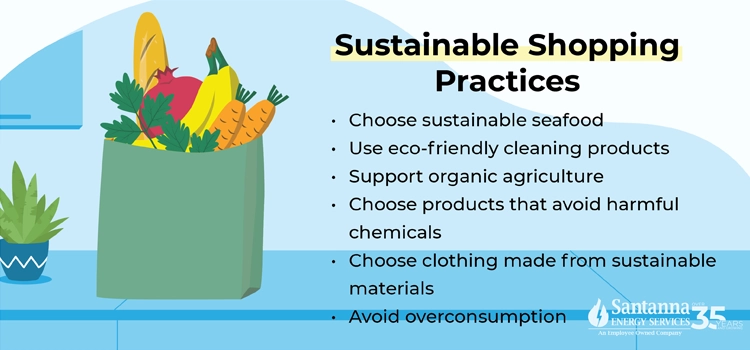
4. Upcycle into new goods
According to National Geographic, about 8 million tons of plastic waste escapes into the oceans from coastal nations. By upcycling, individuals and communities can play a significant role in combating this issue. Upcycling involves repurposing items that would otherwise be discarded as waste, turning them into new products or materials of higher quality or value. By upcycling, we can reduce our consumption of new materials and decrease the amount of waste that ends up in landfills. This helps to conserve natural resources and prevent pollution from the production and disposal of goods.
5. Practice proper waste management
Proper waste management is crucial for maintaining healthy ecosystems. When waste is not properly managed, it can end up in natural habitats and cause harm to plants and animals. This includes plastic pollution in our oceans, which can harm marine life and disrupt entire ecosystems. By practicing proper waste management, such as recycling and composting, we can reduce the amount of waste that ends up in the environment and in turn, support the health of ecosystems. Additionally, proper waste management also helps to conserve natural resources and reduce overall pollution, making it a crucial step in promoting sustainability and protecting our planet’s ecosystems.
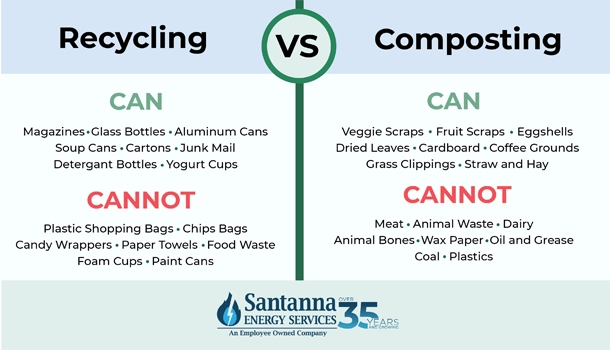
6. Support local environmental organizations
Supporting local environmental organizations is an excellent way to contribute to the health and preservation of ecosystems. These organizations work tirelessly to protect natural habitats, advocate for sustainable practices, and educate communities about the importance of conservation. By supporting them through donations or volunteering, we can help fund critical research and initiatives that benefit both humans and the environment. Additionally, these organizations often collaborate with government agencies and other groups to implement conservation strategies on a larger scale, making our impact even more significant.
7. Engage in restoration and reforestation projects
Engaging in reforestation and restoration projects is a powerful way to support healthy ecosystems. These initiatives involve restoring degraded habitats and planting trees, both of which are essential for maintaining biodiversity and preserving the health of our planet’s ecosystems. By participating in these efforts, we can help mitigate the effects of deforestation, which contributes to climate change and habitat loss for many species.
Equally as important, supporting companies or organizations that align with these goals and incorporate reforestation initiatives into their business practices to further strengthen these crucial efforts. As one example, some energy providers prioritize earth-friendly energy plans that support reforestation projects, aiding in the restoration and preservation of natural habitats while offering sustainable energy solutions. This can allow you to make a real difference with your product purchase.
8. Reduce your use of single-use plastics
It’s important to reduce single-use plastics in your daily routine to support ecosystems. Investing in reusable items like cloth bags and metal straws eliminates the need for disposables, and is easy to do! Bringing your own container when eating out or buying food can also help reduce unnecessary waste. Additionally, composting materials like food scraps instead of throwing them away helps reduce waste from landfills and nourishes the soil for plants. By taking small steps toward reducing our plastic consumption we can make a huge impact on ecosystem health.
Simple ways to protect wildlife every day
While it might seem a little daunting to find ways you can help support ecosystems, we’re happy to share some of our favorite ways you can contribute little actions to protect wildlife every day:
- Respect Natural Habitats: Avoid disturbing natural habitats such as forests, wetlands, and beaches. Stay on designated trails and respect wildlife viewing boundaries to minimize stress to animals.
- Support Sustainable Products: Choose sustainable and eco-friendly products to reduce the demand for resources that harm wildlife habitats and ecosystems.
- Prevent Wildlife Collisions: Be vigilant while driving, especially in areas known for wildlife crossings. Slow down in these areas and be aware of wildlife movement.
- Avoid Feeding Wildlife: Resist the temptation to feed wild animals as it disrupts their natural behaviors and diets, leading to dependency and potential health issues.
- Pet Responsibility: Keep pets indoors or on leashes while outside to prevent them from disturbing or hunting wildlife. Spaying or neutering pets also helps control populations of feral animals that can impact ecosystems.
- Report Illegal Activities: Report any illegal hunting, poaching, or wildlife trafficking activities to relevant authorities.
- Responsible Fishing and Boating: Follow fishing regulations and practice responsible angling. Avoid discarding fishing lines, nets, or other gear into water bodies to prevent wildlife entanglement.
Sustainable land-use practices
Practicing sustainable land practices is crucial for supporting healthy ecosystems. This includes techniques such as crop rotation, reduced tillage, and the use of natural fertilizers. These practices help to maintain soil health, prevent erosion, and conserve water resources. They also promote biodiversity by creating a more diverse and resilient ecosystem. By implementing these methods, we can reduce our impact on the environment and support healthier habitats for all species.
How your energy choice can support ecosystems
By choosing renewable energy sources such as solar or wind power, you can make a positive impact on ecosystem health. Renewable energy production helps reduce emissions of harmful pollutants while also conserving resources. Additionally, renewable energy helps keep hazardous chemicals out of the ecosystems. This can preserve habitats and resources for wildlife. In the same way, switching to renewable energy conserves resources. This can reduce our dependence on non-renewable resources.
In the end, these are just a few ways we can support ecosystems. The best way we can support healthy ecosystems and protect our planet is to commit to making conscious choices in our everyday lives for a healthier tomorrow!
Santanna Energy Services is a supplier of renewable energy solutions in the United States, providing services to Illinois, Indiana, Pennsylvania, Michigan, and Ohio. We provide a wide range of energy services and products to meet the needs of both residential and small business customers. Our mission is to provide innovative and cost-effective energy solutions that will help our customers achieve their energy goals. With over 35 years of experience, we are committed to creating life-long relationships by providing quality service to customers, communities, and employees.
Jenna loves to use her voice to spread awareness about reforestation, eco-friendly initiatives, and protecting planet Earth. She's passionate about making the world a better place and is driven by her desire to give back to the planet. She is committed to learning more about the environment and its preservation and is a strong believer in the power of education and activism.


